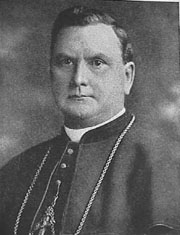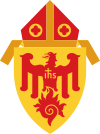James Edward Quigley
James Edward Quigley | |||||||||||||||||||||
|---|---|---|---|---|---|---|---|---|---|---|---|---|---|---|---|---|---|---|---|---|---|
| Archbishop of Chicago | |||||||||||||||||||||
 | |||||||||||||||||||||
| Church | |||||||||||||||||||||
| Archdiocese | Chicago | ||||||||||||||||||||
| Appointed | January 8, 1903 | ||||||||||||||||||||
| Installed | March 10, 1903 | ||||||||||||||||||||
| Term ended | July 10, 1915 | ||||||||||||||||||||
| Predecessor | Patrick Feehan | ||||||||||||||||||||
| Successor | George Mundelein | ||||||||||||||||||||
| Previous post(s) | Bishop of Buffalo | ||||||||||||||||||||
| Personal details | |||||||||||||||||||||
| Born | October 15, 1854 Oshawa, Ontario, Canada | ||||||||||||||||||||
| Died | July 10, 1915 (aged 60) Rochester, New York, US | ||||||||||||||||||||
| Nationality | American | ||||||||||||||||||||
| Education | |||||||||||||||||||||
Ordination history | |||||||||||||||||||||
| |||||||||||||||||||||
| |||||||||||||||||||||
| Source(s):Catholic-Hierarchy.org[1] | |||||||||||||||||||||
James Edward Quigley (October 15, 1854 – July 10, 1915) was a Canadian-born American prelate of the Catholic Church. He served as bishop of the Diocese of Buffalo in New York (1897–1903) and archbishop of the Archdiocese of Chicago in Illinois (1903–1915).
Biography
[edit]Early life and education
[edit]James Quigley was born on October 15, 1854, in Village of Oshawa, Canada West (now Ontario), the son of James and Mary Lacey Quigley, whom arrived around 1849 from Ireland. His family immigrated to the United States when Quigley was age two, settling in Lima, New York.[2] At age ten, he was sent to live with his uncle, Father Edward Quigley, the rector of Immaculate Conception Parish in Buffalo, New York. As a young man, James Quigley worked as a dock worker in Buffalo.[3]
After graduating from St. Joseph's College in Buffalo in 1872, Quigley passed an entrance examination for the United States Military Academy in West Point, New York. However, he soon decided to enter the priesthood instead. Quigley attended Our Lady of Angels Seminary at Niagara Falls, New York. He then went to Europe to study at the University of Innsbruck in Austria and College of Propaganda[clarification needed] in Rome.[4]
Ordination and ministry
[edit]While in Rome, Quigley was ordained a priest by Cardinal Raffaele Monaco La Valletta for the Diocese of Buffalo on April 13, 1879.[1] Following his return to New York, the diocese assigned Quigley as pastor of St. Vincent Parish in Attica. He left St. Vincent's in 1884 to become rector of St. Joseph's Cathedral Parish in Buffalo.[2] He was transferred to St. Bridget's Parish in Buffalo in 1886.[4] Quigley preached in Latin, English, Italian and German. He was also conversant in French and Polish. He served for twelve years as the president of the Catholic Schools Board in Buffalo.[5]
Bishop of Buffalo
[edit]On December 12, 1896, Pope Leo XIII appointed Quigley as bishop of Buffalo. He was consecrated at St. Joseph Cathedral on February 24, 1897, by Archbishop Michael Corrigan.[6][1]
In 1899, the Longshoremen's Union in Buffalo, representing 1,500 workers who scooped grain out of grain ships, went on strike against the Lake Carriers Association. The Association paid these men through the local saloon keepers, who would subtract fees from their pay for room, board and drinks, leaving them very little. When the saloon keepers raised their fees, the workers went on strike. Quigley opened St. Bridget Church as a headquarters for the strikers, gave them strategic support, and acted as a mediator with the carriers. The strike finally ended when the carriers agreed to pay their workers directly.[5][3]
In 1902, Quigley embarked on a public campaign against what he termed "socialism" in labor unions in Buffalo. He claimed that some union regulations were unjust and oppressive to Catholic workers. Quigley wrote a pastoral letter in German to the German parishes that called on union members to assert their rights regarding union governance. He also spoke at mass meetings. While claiming to support the union movement, Quigley denounced socialism and gave his interpretation of why the Catholic Church opposed it.[5] As a result of his anti-socialism campaign in Buffalo, Quigley gained a national reputation.[7][8]
Archbishop of Chicago
[edit]Quigley was appointed archbishop of Chicago by Leo XIII on January 8, 1903, and installed on March 10, 1903.[9] In 1905, Quigley asked Reverend John De Schryver, a professor at St. Ignatius College Prep in Chicago, to organize St. John Berchmans Parish for Belgian Catholics.[10] Parishes for Italian and Lithuanian immigrants were also established. The resulting parishes flourished as an "important spiritual, cultural, and educational component of Chicago's life."[11] Quigley also commissioned the Bishops' Mausoleum in Mount Carmel Cemetery, which was completed in 1912.[12]
In 1910, Quigley approached Reverend Francis X. McCabe, president of DePaul University, about the lack of higher education opportunities for Catholic women in the archdiocese. DePaul began admitting women the following year.[13]
Death and legacy
[edit]In June 1915, in declining health, Quigley traveled to Rochester, New York, to stay with his brother while receiving medical treatment. James Quigley died in Rochester from what was called paralysis on July 10, 1915, at age 60.[14]
A 1915 resolution by the Chicago City Council named Quigley as;
"...one of those men who work quietly and behind the scenes, and who seek no public credit or applause for the work which they do; ...he spent himself...in particular in the service of the many and varied works of charity which have been founded..."[15]
The Archbishop Quigley Center in Chicago, formerly the Archbishop Quigley Preparatory Seminary, is named in his honor.
References
[edit]- ^ a b c "Archbishop James Edward Quigley". Catholic-Hierarchy.org. David M. Cheney. February 25, 2024.
- ^ a b Waterman, Arba Nelson (1908). Historical Review of Chicago and Cook County. The Lewis Publishing Company.
- ^ a b "The Dock Strike of 1899 – WNY Heritage". www.wnyheritage.org. Retrieved May 15, 2022.
- ^ a b Melody, John (1908). "Archdiocese of Chicago". Catholic Encyclopedia. Vol. 3. New York: Robert Appleton Company.
- ^ a b c Czarnecki, Anthony. "The Most Reverend James Edward Quigley", Hearst's International, Vol.4, International Publications, Incorporated, 1903
- ^ History of the Seminary of Our Lady of Angels: Niagara University, Niagara County, N.Y., 1856-1906. Matthews-Northrup Works. 1906.
- ^ Donohue, Thomas (1908). "Buffalo". The Catholic Encyclopedia. Vol. 3. New York: Robert Appleton Company. Retrieved October 4, 2015.
- ^ Lafort, Remigius. The Catholic Church in the United States of America: Undertaken to Celebrate the Golden Jubilee of His Holiness, Pope Pius X., vol. 3, Catholic editing Company, 1914, p. 458
 This article incorporates text from this source, which is in the public domain.
This article incorporates text from this source, which is in the public domain.
- ^ "Meet the previous leaders of the church in Chicago". Chicago Catholic. Retrieved November 25, 2024.
- ^ ""Our History", St. John Berchmans School". Archived from the original on June 28, 2022. Retrieved February 16, 2020.
- ^ Avella, Steven. "Roman Catholic Archdiocese of Chicago", Encyclopedia of Chicago
- ^ "Mount Carmel (Hillside)". CatholicCemeteriesOfChicago. Retrieved December 23, 2024.
- ^ "Into the Archives | Sections | DePaul University Newsline | DePaul University, Chicago". resources.depaul.edu. Retrieved November 19, 2024.
- ^ Times, peeial to The liew York (July 11, 1915). "ARCHBISHOP QUI6LEY 0F G,.IA0 xs DEADt; Prelate Finally Succumbs to Paralysis at the Home of His Brother in Rochester. oNcE BISHOP OF BUFFALO He Settled Longshoremen'a Strike There After State Board Had Failed—Head of 300 Churches". The New York Times. ISSN 0362-4331. Retrieved May 15, 2022.
- ^ Statistics, Chicago (Ill ) Bureau of (1915). The Chicago City Manual. Bureau of Statistics and Municipal library.
- 1854 births
- 1915 deaths
- 19th-century Roman Catholic bishops in the United States
- 20th-century Roman Catholic archbishops in the United States
- American Roman Catholic clergy of Irish descent
- Roman Catholic archbishops of Chicago
- Burials at the Bishop's Mausoleum, Mount Carmel Cemetery (Hillside)
- Emigrants from pre-Confederation Ontario to the United States
- Clergy from Chicago
- Roman Catholic bishops of Buffalo
- St. Joseph's Collegiate Institute alumni
- University of Innsbruck alumni



